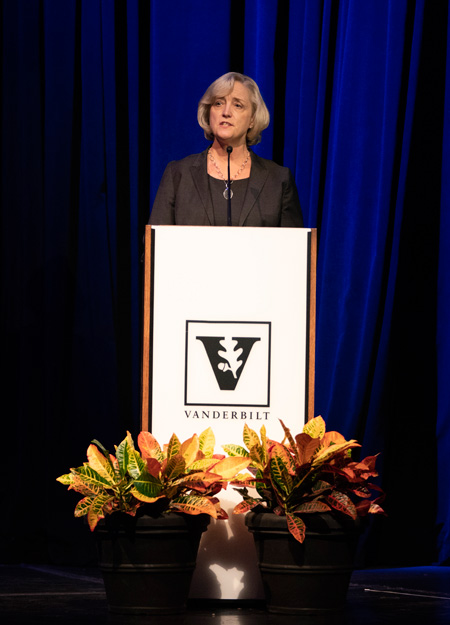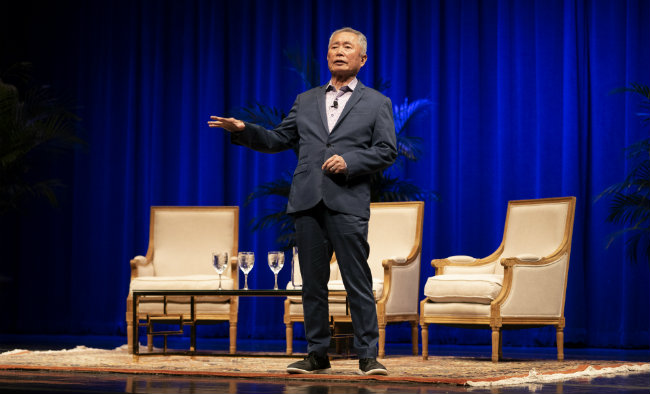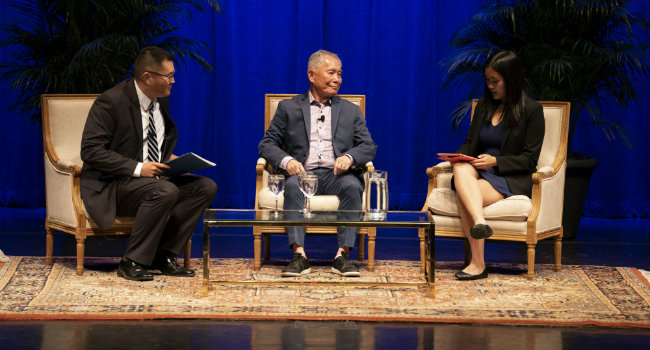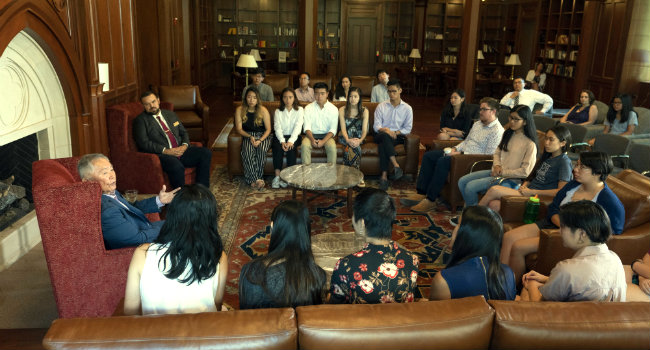The challenges that George Takei endured as a child during and after his family’s wrongful internment as Japanese Americans during World War II have propelled his human rights and immigration activism, the prominent television, film and stage actor told the Vanderbilt community during his Chancellor’s Lecture Oct. 2.
Takei, who played Hikaru Sulu on the original Star Trek television series, shared vivid details of his life story—from his childhood experiences in two internment camps and on Skid Row in Los Angeles to his transformation from being silent on LGTBQ rights and marriage equality to now using his public platform to loudly voice support.

Interim Chancellor and Provost Susan R. Wente introduced Takei to nearly a thousand Vanderbilt students, faculty, staff and members of the community at Langford Auditorium. She noted that the theme of this fall’s lecture series, “Culture of Respect; Culture of Caring,” aligns with Takei’s role as a passionate advocate for human rights.
“George Takei has served as the spokesperson for the Human Rights Campaign’s ‘Coming Out Project’ and as cultural affairs chairman of the Japanese American Citizens League,” Wente said. “At every turn, he has leveraged his success to raise awareness about issues that matter and to fight discrimination and injustice.”
Takei opened his talk by describing the terrifying moments in 1942 when he and his family were forced out of their home at gunpoint. “We and other Japanese American families were crammed into train cars that transported us to the swamps of Arkansas for a degrading and humiliating experience,” he said. “After the war ended, the Japanese Americans were freed, but we had to start over with very few resources. The government had taken everything from us—our homes, businesses and bank accounts.”
Following his family’s release, Takei became a voracious reader of history books, but he could not find any writings on the internment of Japanese Americans. The only resource at that time was his father’s perspective. “Despite all that my father experienced and his fears for the future, he believed our democracy was still the best form of government in the world,” Takei said. “He reminded me that we are part of a people’s democracy, and sometimes things that are not right happen in a people’s democracy. But the people have the capacity to do great things.”

Takei never forgot his father’s words as he became increasingly involved in political advocacy—from supporting civil rights and opposing the Vietnam War to volunteering in several political campaigns.
One issue where he long stayed quiet was his sexual orientation. “It was a very lonely feeling,” Takei said. “I wanted to be an actor and knew back then that I couldn’t get hired if I came out as gay. I continued to act straight and was closeted for much of my adult life.”
In 2005, the California legislature passed a bill giving same-sex partners the right to marry, but then-Gov. Arnold Schwarzenegger vetoed it. Takei became frustrated and angry and decided that he could no longer be silent on this issue. He and his husband, Brad, were among the first gay couples in California to apply for a marriage license after their state’s highest court legalized gay marriage.
Following Takei’s talk Wednesday night, he took part in a Q&A with Kitt Carpenter, the E. Bronson Ingram Chair of Economics, director of Public Policy Studies and director of the Vanderbilt LGBT Policy Lab; and Alyson Win, communications chair of the Asian American Student Association.

Win asked Takei if he thought that the policy of imprisoning innocent Japanese Americans during World War II after Japan attacked Pearl Harbor could ever happen again. Takei responded that, in many ways, history is repeating itself with the current administration’s measures to stop the flow of migrants across the border between Mexico and the United States.
“What is happening on the southern border is intentional evil,” Takei said. “Children, even infants, are torn away from their parents as a deterrent. They’re put in crowded spaces, with some children even sleeping on top of each other.” He noted that even when Japanese American families were ordered into camps during World War II, the children were not separated from their parents.
Takei wrapped up the evening by signing copies of his new book, They Called Us Enemy, a memoir of his childhood experience in the Japanese American internment camps. The book, released in July, is a New York Times bestseller.
Earlier in the afternoon, Takei met with students in the Great Room of E. Bronson Ingram College. His visit to campus was part of Vanderbilt’s celebration of Asian Pacific American Heritage Month.

The Chancellor’s Lecture Series strives to connect the university and the Nashville community with leaders and visionaries who are shaping our world. Doris Kearns Goodwin and Jon Meacham, two Pulitzer Prize-winning presidential historians, will discuss “Presidential Leadership Lessons” in Ingram Hall at the Blair School of Music on Oct. 31.
For more information about the series, visit the Chancellor’s Lecture Series website, email cls@vanderbilt.edu or follow @VU_Chancellor on Twitter and Instagram.